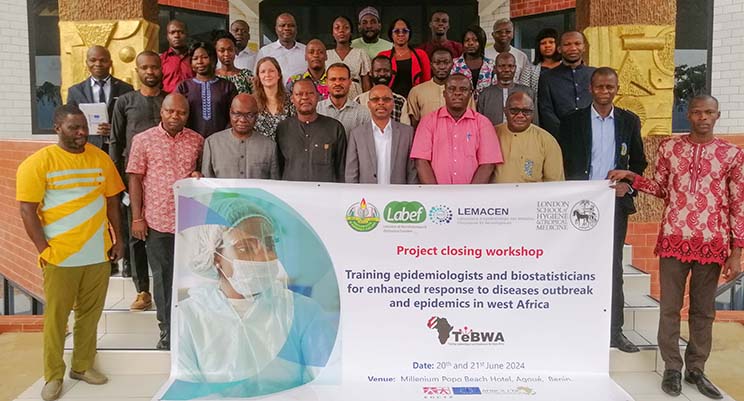TEBWA project closing workshop

dav
From 20-21 June 2024, the project Training epidemiologists and biostatisticians for enhanced response to disease outbreaks and epidemics in West Africa (TEBWA), held its closing in Agoue, Benin. Ms Nuraan Fakier, Project Officer, EDCTP Association, joined the workshop online.
The TEBWA project is coordinated by the University of Abomey-Calavi (Benin) in collaboration with the London School of Hygiene and Tropical Medicine (LSHTM, UK) and the National Agency for Primary Health Care of the Ministry of Health (ANSSP/MoH, Benin). It aimed to train 15 Master’s-level specialists in Epidemiology and Biostatistics for West Africa. The project is part of the collaboration between EDCTP and Africa CDC to support institutions in sub-Saharan Africa and Europe to provide Master’s degree training in epidemiology and biostatistics.
The closing workshop aimed to summarise the achievements, lessons learnt and perspectives from the project, share results of the research conducted by the Fellows, and engage stakeholders on the sustainability of the project.
On day 1, the opening ceremony was marked by several speeches, namely from the Coordinator (Prof. Romain Glèlè Kakaï), the Honorary Director of the Doctoral School in Health Sciences of the University of Abomey-Calavi (Prof. Dismand Houinato), and the Director of the Doctoral School of Agronomic and Water Sciences (Prof. Marcel Houinato). All speakers recognised the merits of the TEBWA project and the immense support from EDCTP2 and wished that this collaboration could continue.
The achievements, lessons learned, and perspectives of the project were presented, as well as the feedback received from TEBWA Fellows about the project implementation, the support they received, the project’s impact on their capacity, the project activities, and suggestions for improvement. Discussions revolved around creating a network of West African Biostatisticians and TEBWA alumni (which is already ongoing) and creating a Centre/Institute of Epidemiology and Biostatistics.
Seven out of the 15 TEBWA Fellows presented the results of their research, which covered statistical and mathematical modelling, as well as meta-analysis on diseases, such as COVID-19, lassa fever, cholera, and malaria. They received feedback from experts in epidemiology and biostatistics to incorporate in their manuscripts, which are currently being prepared.
In the last session, the TEBWA Fellows and participants were trained on “Geospatial and web-based mapping of health outcomes” with Prof. Justice Moses K. Aheto, an Associate Professor at the Department of Biostatistics (University of Ghana, Accra).
On day 2, they continued with the presentations of the research results carried out by the TEBWA Fellows. Eight TEBWA fellows presented their work, which covers various topics, such as data quality in measles surveillance systems in sub-Saharan Africa, incidence of measles and associated factors in Niger, preparedness response to Lassa viral haemorrhagic fever in sub-Saharan Africa, the Management of epidemiological data on Ebola haemorrhagic fever in west and central Africa, the modelling of the impact of climate on cholera disease transmission dynamics in Africa, risk perception and impacts of non-conventional medicine on COVID-19 in West Africa, and machine learning based modelling of Ebola virus disease and Malaria.
In the last session, five speakers, namely Prof. Glèlè Kakaï Romain (TEBWA project Coordinator), Prof. Houinato Dismand (TEBWA project staff), Prof. Vigan Jacques (TEBWA project staff), and two representatives from the 15 TEBWA Fellows hosted a panel discussion on the project perspectives. The panel discussion was very productive and full of emotions and advice.
